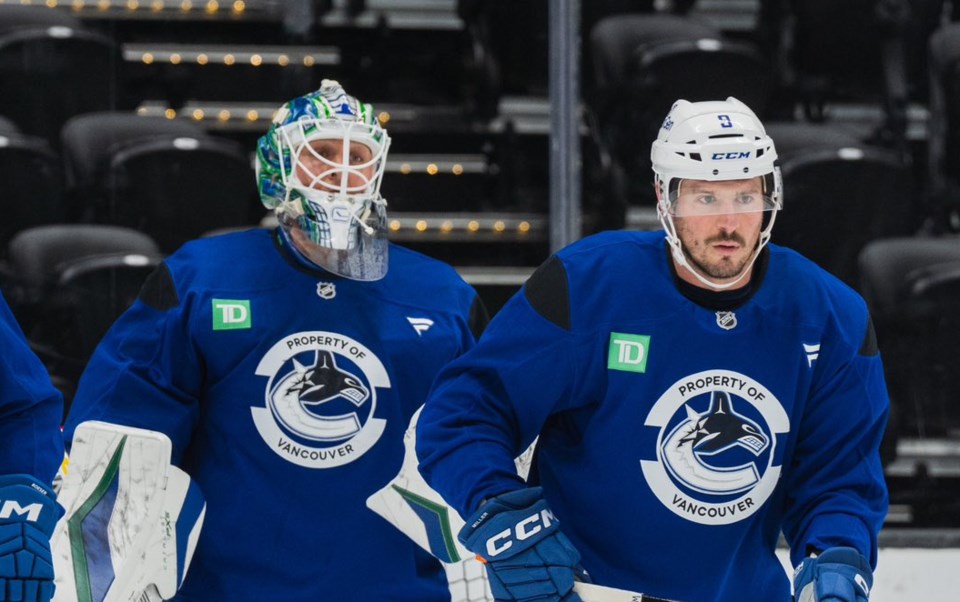The big news around the NHL on Wednesday was the reveal of the rosters for February’s 4 Nations Face-Off.
The mid-season tournament features the eponymous four nations — Canada, the U.S., Sweden, and Finland — eponymously facing off in Montreal and Boston from February 12 to February 20. The tournament replaces the All-Star Game and its festivities, which won’t be held again until 2027 since NHL players will head back to the Winter Olympics in 2026 for the first time since 2014.
Hughes, Miller, Pettersson, and Lankinen named to 4 Nations rosters
Four Canucks were named to their nations’ rosters on Wednesday. Quinn Hughes and J.T. Miller will represent the U.S., Elias Pettersson will represent Sweden, and Kevin Lankinen will represent Finland.
The thing is, I’m just not sure I care.
I can’t even muster up any annoyance at Brock Boeser, coming off a 40-goal season, got snubbed by Team USA. If anything, I feel relief, as Boeser will get a nice break in February to rest up for the final stretch of the regular season and the playoffs.
Last year, the Canucks had six representatives at : Quinn Hughes, Elias Pettersson, J.T. Miller, Brock Boeser, Thatcher Demko, and Elias Lindholm.
Arguably, it would have been better if a few of those stars had been able to get a week off instead. The Canucks came out of the All-Star break and lost 8 of their next 13 games. Pettersson, in particular, saw a steady decline in his game down the stretch as the tendinitis in his knee worsened. A rest might have helped him out.
That was just an All-Star Game, where no one is giving their all on the ice: the pace is low, the physical contact is minimal, and the odds of suffering an injury are low, .
The 4 Nations Face-Off, however, will be full-pace and full-contact. An injury to one of the Canucks’ stars at the tournament could be devastating for their chances in the playoffs.
The 4 Nations Face-Off isn't a true best-on-best tournament
Hockey always carries a risk of injury, of course, but there’s a tradeoff that comes with that risk: a reward. In the NHL, players put their bodies on the line in hopes of winning the Stanley Cup. At the Olympics and World Championships, they’re playing for a gold medal for their home country.
The 4 Nations Face-Off is not the Olympics or the World Championships but a secret third thing where the NHL gets to keep all the money.
Certainly, players will be excited to represent their country at the tournament, particularly those who haven’t had many opportunities to do so in the past. But even then, there’s something missing: other countries.
It’s not a true international best-on-best tournament with only four countries represented.
Martin Necas is currently tied for the NHL lead in scoring but he won’t be at the 4 Nations Face-Off because he’s from Czechia, which didn’t get a team in the tournament despite being the reigning World Champions.
That leaves out other Czech stars like David Pastrnak, Tomas Hertl, Pavel Zacha, Filip Chytil, and Canucks defenceman Filip Hronek, though Hronek’s injury might have kept him out of the tournament in any case.
Will the 4 Nations Face-Off be Olympic-level hockey?
Some of it is simply numbers. Since the rosters are composed entirely of NHL players, countries with limited representation would have had trouble putting together a full roster. Only 20 Czech skaters and six Czech goaltenders have played in the NHL this season. Of course, the Czech team could have dug into the AHL to complete their roster — 33 Czechs have played in the AHL this season, though that it includes some overlap with players who have been called up to the NHL.
There’s also the logistics of trying to fit an entire tournament in the span of eight days. Too many teams would have made it unwieldy.
But the four-nation format undercuts the whole “best-on-best” selling point of the tournament.
At least the 2016 World Cup of Hockey featured eight teams, including the novelty of an eight-country alliance in Team Europe and the young guns of the under-23 Team North America. Team Europe even made it all the way to the championship game against Canada, providing a nice little storyline of different countries coming together as a collective underdog.
This tournament won’t have any of that. Sure, there will be a bit of a thrill seeing the Canada-U.S. and Sweden-Finland rivalries rekindled but since they’re not going to be playing for gold, it feels a little hollow.
Will this be truly be Olympic-level hockey with the best players in the world going all-out to win glory for their country? Or will it just be exhibition-caliber hockey like a glorified preseason before the Olympics next year?
And if it is Olympic-level hockey, will the risk of injury really be worth it?
I don’t know.
Maybe my enthusiasm for the 4 Nations Face-Off will grow once February comes around. Maybe the quality of the hockey will be so undeniable that it will win me over. But right now, I find it hard to get excited.




